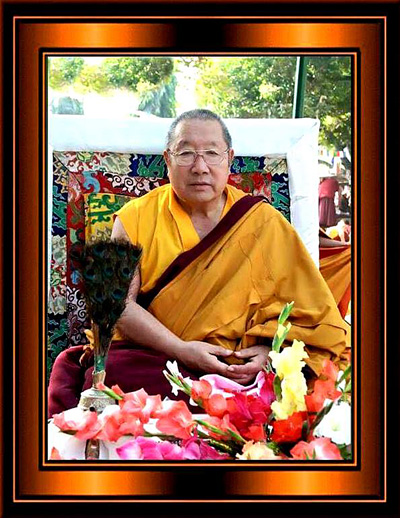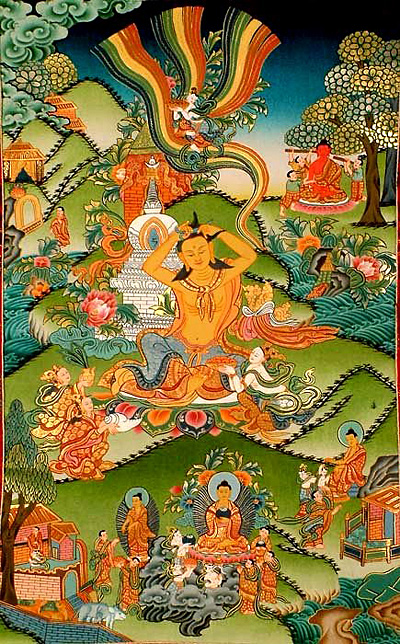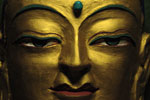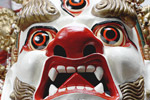Interview of Drubwang Penor Rinpoche about monastic tradition
There are recurring thoughts about the benefits and difficulties associated with serious modern practitioners entering monastic life or seeking ordination.
Whereas the benfits of real, genuine, ordination are beyond description in terms of benefit to the individual concerned and par extension all sentient beings, the aspirations of many are shrouded in layers of misconceptions, historical misunderstanding and a thick web of material spiritualism. When this fundamental lack of comprehension of the meaning, purpose and layers of ordination are so manifestly latent in the aspirant pool, how can obstacle free paths emerge from there?
Here are a series of short articles which may help to anchor certain key points for personal reflection, bearing in mind, that whatever the tradition one follows — and one has to be attached to a specific tradition in order to ordain meaningfully and genuinely under a spiritual recognised master- then only the realised Master from which we take precepts can truly apprehend our actual ability to engage, maintain and benefit for oneself and thus others from this ordination.
To start with here is the reproduction of an interview several years old of my late Master Drubwang Penor Rinpoche in a very informative session led by Andrew Cohen.

His Holiness Pema Norbu Rinpoche, head of the Nyingma line (1932-2009)
Andrew Cohen: Rinpoche, many people in the West are becoming interested in
the Buddha-dharma. You’re a monk. And the Buddha himself was a monk. What are
the virtues of monkhood for the spiritual aspirant?
PENOR RINPOCHE: In sutra, the Buddha taught that being a
renunciate and becoming a monk will help one follow the spiritual path in a
better way. First, one receives ordination and vows, and then one renounces the
world and becomes a monk. With that as the basis for one’s moral conduct, one
will have a deeper and more firm understanding. One will have more power in the
practice of the spiritual path. Being a renunciate monk is more powerful than
just being a lay practitioner.
AC: The great nineteenth-century Tibetan Nyingma yogi Shabkar said,
when speaking about the worldly life,
Meat, liquor, sense pleasures,
worldly enjoyments—the best things of samsara are temporarily beguiling.
Young brides in the full bloom of youth and beauty are expert at leading one
astray. Therefore, even if you have as your companion a young daughter of the
gods, have no attachment, have no desire. Why? Speaking generally, because all
things of this world are without essence, impermanent, unreliable, and by their
very nature lead to suffering. In particular, because domestic life is like a
pit of fire, a cannibal island, a nest of poisonous snakes. Enjoying the entire
array of samsaric perfections, wealth, and pleasures is like eating food
mixed with poison, like licking honey on a razor blade, like the jewel on a
snake’s head: a single touch destroys.
Rinpoche, could you speak a little bit about the dangers of the worldly life
and its pitfalls for the spiritual aspirant?
PR: It is said that if someone is attached to a minor pleasure or
happiness, there is no way that person can attain a greater spiritual happiness
or pleasure. In samsaric life, one is mainly influenced by the five
afflicted minds of desire, hatred, anger, jealousy, and pride. And wherever there is affliction, whoever is influenced by those afflictions will naturally take rebirth in samsara endlessly. You see, there is no limit to samsara, even though there is also no essence to it.
AC: You said in an interview you recently gave in Toronto, "There is such a hunger [for the dharma] in the West. The way to receive the dharma is to find the teachings and absorb them. You shouldn’t just be thinking of this world. You have to think about transcendence—something other than just material life." Could you please explain what you mean by that? What is it that needs to be renounced in order to transcend the world?
PR: Many Westerners are interested in studying Buddhism and also want to follow a spiritual practice. However, we like samsara, we like this world, and we work for it and try to accomplish something within it. But there is no limit and no end to what we could try to achieve. Whatever we may achieve in this world, whether we acquire all kinds of material objects or rank, still there is nothing we can really rely upon. Everything is impermanent; it only lasts for a few moments. Things like rank or material objects do not really benefit or help anybody because when death comes, we cannot carry anything with us.
But there is a way that we can become liberated from the suffering of samsara. If we follow the Buddha’s teaching as a spiritual path, then we can transcend this world from a place of real depth. We can achieve ultimate peace and happiness, enlightenment, only through the spiritual path. And that depends upon receiving teachings from a lama. It also depends upon ourselves, how much we really understand through the practice and mainly, how much we do the practice. Depending upon these things, we could experience fruition.
The vows, which are for moral conduct, are the basic ground for the spiritual path. They are like the foundation of a house. Without that basic ground, we cannot build a house. So one has to give up all the afflicted minds—desire, hatred, anger, jealousy, and pride—that which manifests from your mind and afflicts your mind and distracts you in the world. But even though we have to give up the afflicted minds, it is not very easy to abandon them immediately. That is why we have to study and then apply what we have studied to our practice. Then eventually we can completely abandon all these afflictions. So if one uses one’s highest faculty or intellectual mind with much diligence, one can carry through the practice. You see, it is possible within one lifetime to get liberated, but it might take many lifetimes.
AC: The great Chatrul Rinpoche and I became friends in the early 1990s. In one of our meetings he said to me, The most important thing is to have renunciation. If you have renunciation, it means you realize that there’s actually no essence to the world. I mean, there’s nothing of it. The world has no real essence; it’s meaningless, the whole of samsara is just meaningless. In fact, if you have complete realization of the faults of samsara, that is realization. That means you have gone beyond samsara to understanding that this world has no ultimate meaning.
He went on to say, "Renunciation is the whole basis of the spiritual path. If you don’t have renunciation, you don’t have realization. . . . In the end, if you want to be free, you have to cultivate a disgust for samsara."
So I wanted to ask you Rinpoche, do you agree? What does it mean to cultivate a disgust for samsara? Why is renunciation said to be the whole basis of the spiritual path?
PR: Chatrul Rinpoche is a very great realized lama. And what he said is true. We have to see the suffering of samsara, that which makes you feel disgusted. However much effort we may put into samsaric activity, eventually we will have to see that we cannot achieve ultimate happiness that way. We have to see that samsara is impermanent and actually taste that there is no essence to it and feel that disgust. But not only that, on the other side, we have to intend to attain enlightenment, which is the opposite of samsara.
In reality, there is no real essence to samsara because everything is so temporary. It is not reliable, even for one moment. If we want to achieve enlightenment or ultimate happiness, then we have to see it in that way until we are liberated.
It is said that there is no essence in samsara. But in fact, one could also say there is an essence because all of us are bound in samsara for millions and billions of lifetimes! And even if we think that we want to do some dharma practice, we don’t do it—because we are completely bound up in samsara. Just getting through spiritual practice—even one or two hours—is so difficult and we so easily get bored. But we spend our whole lifetime working in samsara, and still we do not get bored with it. That itself is the essence of samsara and the power of samsara.
Renunciation means to renounce all worldly things. If one wants to be liberated, one needs to have one’s mind turned away from worldly things. Until and unless we have the intention to do that, we will not be able to apply ourselves to the practice for enlightenment.

Buddha cut hair as a sign of rejection of Samsara.
AC: The Buddha said, "The blue-necked peacock which flies through the air never approaches the speed of the swan. Similarly, the householder can never resemble the monk who is endowed with the qualities of the sage, who meditates aloof in the jungle." Yet, an influential American Buddhist meditation teacher, Jack Kornfield, says in his new bestselling book, "The sacrifices of family are like those of any demanding monastery, offering exactly the same training in renunciation, patience, steadiness, and generosity." Could that really be true?
PR: It is not true. When you are in a household, in the worldly life, even if you have spiritual training, there is always more attachment. Being a householder and wanting to have liberation from the afflictions of mind is good. But that is very difficult within those kinds of conditions. Yet even if you are in a monastery, you still need all the training so that you can get rid of those defilements. But of course it still does not mean that only by entering a monastery you can be liberated.
AC: There is a new spiritual movement being born in America at this time. It’s called the "new American spirituality." One of its leading proponents, Elizabeth Lesser, says, "The unique and most positive aspect of the new American spirituality is its emphasis on self-authority." Indeed, she says, "With democratic spirituality it no longer makes sense for an [external] authority to describe to you the sacred truth and the path to discover it. In [new American spirituality], you map the journey." Rinpoche, you come from a great tradition where success on the spiritual journey is entirely dependent upon the seeker taking refuge in the Triple Gem of the Buddha, the Dharma and the Sangha. The great Nyingma Master Patrul Rinpoche said,
"No sutra, tantra, or shastra speaks of any being attaining perfect Buddhahood without having followed a spiritual teacher. We can see for ourselves that nobody has ever developed the accomplishments belonging to the stages and paths by means of their own ingenuity and prowess. Indeed, all beings, ourselves included, show particular talent in discovering the wrong paths to take—while when it comes to following the path leading to liberation and omniscience we are as confused as a blind person wandering alone in the middle of a desert plain. No one can bring back jewels from a treasure island without relying on an experienced navigator. Likewise, a spiritual teacher or companion is our true guide to liberation and omniscience, and we must follow him with respect. This is accomplished in three phases: firstly, by examining the teacher, then by following him, and finally by emulating his realization and his actions."
So how do you, Rinpoche, as head of the Nyingma school of Tibetan Buddhism, feel about the dharma of the new American spirituality? What is your response to the notion of self-authority on the spiritual path?
PR: What Patrul Rinpoche said is true. Even the Buddha taught in that way. All the past, present and future Buddhas had to depend upon a master who could guide them to the spiritual path that they could follow in a proper way—where there is the method to liberate. Without a master, there is no way anyone can attain enlightenment.
AC: How do you feel about the notion of democracy, which is an American ideal, being applied to the path to enlightenment?
PR: There is no benefit to following the democratic spiritual path. And there is no power that can be established through it. That is the problem. And why? It is not because they have more afflictions like hatred or anger or anything like that—they do have some compassion. But this kind of practice will not bring any result; they are just wasting time.
The main reason is this: one has to receive transmissions and blessings from the lama, the master, from someone who has the experience of what is called enlightenment, otherwise there is no real path. Having a qualified master who really knows how to guide one on the spiritual path becomes a real antidote that liberates one from the suffering of samsara. From the enlightened Buddha until the present masters, the enlightened mind has been transmitted from master to disciple. Whenever that transmission takes place, it has to be kept very pure, without breaking any precepts, samayas, or words of honor. There has to be a very pure lineage, otherwise there will be obstacles on the path and one will not achieve ultimate realization. If a seed is a little bit rotten, it will not grow.
If someone does not have that clear understanding, that clear experience, that clear realization to guide another, then others cannot really benefit. That is why we have to rely upon someone who has this kind of realization and get guidance through them. Everything depends upon having a qualified master to guide one on the path.
The path that the Buddha attained complete enlightenment by is what he has been giving in all these teachings. This is how he guided the rest of his followers: "If you do this kind of practice, then you can have this kind of liberation." In India and Tibet, there are thousands of practitioners following Buddha’s teaching and instruction, and they have gotten all kinds of realization and benefit. As we carry through with our spiritual practice, one needs to have some kind of result or benefit or power. Not just a small result or benefit. We need to have the immeasurable benefit of having the ultimate realization of attaining complete enlightenment.
AC: Would you say that the notion of democratic spirituality is comfortable for the ego?
PR: Yes, it is comfortable for the ego. They think, "Oh, I have my rights." They think, "I’ll just feel comfortable." This is not beneficial. If you have a seed and the seed does not have a very energetic core, even if we plant it, it will not grow to fruition.
AC: Rinpoche, these days more and more people are practicing Buddhist methods of meditation. Some practice with some understanding of the Buddha’s teaching of emptiness—the teaching that all phenomena and experience is ultimately empty and without substance. Other people practice meditation without any understanding of emptiness or appreciation of its fundamental role in the Buddha’s teaching. Can dharma practice lead to liberation without the practice being grounded in an understanding that emptiness is the basis of everything?
PR: In general, emptiness has many levels. Only thinking or feeling that one is experiencing emptiness doesn’t necessarily lead to enlightenment. It is very difficult for someone who does not have any understanding of emptiness, or who is just doing simple meditation, to attain realization. To have realization, one has to have a path that liberates. And liberation means to be liberated from this afflicted mind. So to be liberated from this afflicted mind, one needs to have the antidote. And the antidote is the realization of selflessness, or emptiness of the self and all phenomena. But if one just carries through the practice, then slowly one reaches higher levels of the path, and in that way, slowly, one can have liberation.
AC: Can spiritual practice lead to enlightenment or liberation from the world without the practitioner inwardly renouncing his or her attachment to the world?
PR: The problem is that one will not release that attachment and will not realize emptiness.
AC: Because one is still attached to the world?
PR: Yes
By
undumbara.wordpress.com
![]()
![]()
![]()
![]()










